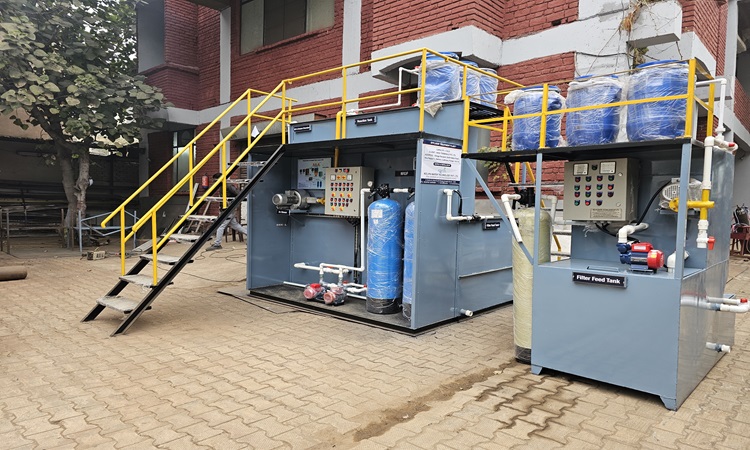Effluent Evolution: Smarter, Cleaner, Greener

In today’s rapidly industrializing world, sustainability is no longer a choice—it’s a necessity. As industries grow, so does the challenge of managing wastewater responsibly. This is where the concept of Effluent Treatment Plant comes into play. Over the years, effluent treatment technology has evolved from basic filtration systems to advanced, automated solutions that ensure cleaner discharge, reduced energy consumption, and a greener future. This article explores the evolution of effluent treatment, its importance, and how Kelvin Water Technologies Pvt. Ltd. is leading this transformation with innovative and eco-friendly solutions.
Understanding Effluent Treatment Plants
An Effluent Treatment Plant is a system designed to treat industrial wastewater before it is released into the environment or reused for other processes. The primary objective of an ETP is to remove harmful contaminants—such as chemicals, oils, heavy metals, and suspended solids—from wastewater, ensuring compliance with environmental regulations.
Industries like pharmaceuticals, textiles, chemicals, food processing, and refineries generate large volumes of effluent that, if left untreated, can pollute water bodies and soil. Hence, installing an efficient ETP is both a legal and environmental requirement.
The process typically includes several stages—preliminary, primary, secondary, and tertiary treatment—each designed to remove specific impurities. Over time, advancements in technology have made these systems more compact, energy-efficient, and automated, marking a new phase in Effluent Evolution.
The Evolution of Effluent Treatment Technology
Effluent treatment has come a long way from traditional sedimentation tanks and manual operations. Let’s explore how this evolution unfolded:
1. Conventional Era (Manual Operations)
In the early days, effluent treatment plants were largely mechanical, relying on physical and chemical treatment methods like sedimentation, coagulation, and filtration. While effective, these systems required significant manual intervention and were not highly efficient in removing complex organic pollutants.
2. Automation and Mechanization
With technological advancement, semi-automated systems replaced manual processes. This period saw the introduction of sensors, pumps, and aeration systems that improved consistency and reduced human error.
3. Biological and Advanced Treatment
The integration of biological treatment methods such as Activated Sludge Processes (ASP) and Moving Bed Biofilm Reactors (MBBR) transformed the industry. These processes used microorganisms to break down organic matter, achieving higher purification levels and meeting stricter discharge norms.
4. Smart and Sustainable ETP Solutions
The current generation of effluent treatment plants incorporates smart technologies such as IoT monitoring, membrane filtration (UF/RO), and energy recovery systems. These modern systems not only treat wastewater effectively but also minimize operational costs, optimize energy use, and support water reuse—making them smarter, cleaner, and greener.
Why Effluent Treatment Matters?
Effluent treatment is crucial for both environmental protection and business sustainability. Without proper treatment, industrial effluents can contaminate water resources, disrupt ecosystems, and pose severe health risks. Implementing a reliable ETP Plant ensures:
- Regulatory Compliance: Meets all environmental standards and discharge norms set by authorities like CPCB and SPCB.
- Water Reuse: Treated effluent can be recycled for cooling, washing, or irrigation, reducing freshwater dependency.
- Reduced Environmental Impact: Protects soil and groundwater from contamination.
- Cost Efficiency: Smart ETP systems reduce water and energy bills while lowering sludge disposal costs.
- Corporate Sustainability: Enhances a company’s green image and supports ESG (Environmental, Social, and Governance) goals.
Kelvin Water Technologies Pvt. Ltd. – Driving Innovation in ETP Solutions
When it comes to advanced Effluent Treatment Plants, Kelvin Water Technologies Pvt. Ltd. stands as a trusted and leading name in India. With years of experience and technical expertise, Kelvin Water Technologies specializes in designing, manufacturing, and supplying efficient ETP systems tailored to diverse industrial sectors.
1. Customized ETP Design
Kelvin’s engineers develop customized ETPs based on specific wastewater characteristics and industry requirements. Each system is designed to deliver optimal results—whether for small-scale units or large industrial complexes.
2. Advanced Treatment Technologies
The company integrates cutting-edge technologies such as MBBR, SBR, UF, RO, and chemical dosing systems. These innovations help industries achieve higher purification rates, meet zero-liquid-discharge (ZLD) goals, and reduce operational costs.
3. Energy-Efficient and Eco-Friendly Solutions
Kelvin Water Technologies focuses on developing smarter, cleaner, and greener solutions. Their ETP systems are designed for minimal energy consumption and low maintenance, promoting sustainability without compromising performance.
4. End-to-End Services
From consultation and design to installation and maintenance, Kelvin provides complete support throughout the project lifecycle. Their after-sales service and technical guidance ensure smooth, long-term ETP operations.
5. Commitment to a Sustainable Future
With the vision of a pollution-free India, Kelvin Water Technologies continues to invest in R&D, promoting water recycling, reuse, and zero discharge concepts across industries. Their mission aligns perfectly with the idea of Effluent Evolution—creating smarter systems for a cleaner and greener tomorrow.
Effluent Treatment: A Step Towards Circular Economy
Modern ETP systems play a key role in building a circular economy where waste is minimized and resources are reused. Treated effluent can be safely reused in several industrial operations, reducing the dependency on freshwater sources. The sludge generated can be processed into useful by-products, turning waste into value.
Kelvin Water Technologies encourages industries to adopt such sustainable models. Their advanced Effluent Treatment Plants not only meet environmental standards but also help industries transition toward responsible resource management.
Features of Modern Effluent Treatment Plants
- Compact, modular design suitable for space constraints
- Automated monitoring and control through IoT
- Low energy consumption and high efficiency
- Durable, corrosion-resistant construction
- Easy installation and minimal maintenance
- Compliance with all pollution control board norms
Conclusion
The journey of Effluent Evolution: Smarter, Cleaner, Greener reflects how far the world has come in addressing industrial wastewater challenges. From basic mechanical systems to intelligent, automated, and eco-friendly technologies, effluent treatment has truly evolved into a symbol of sustainability and innovation.
Kelvin Water Technologies Pvt. Ltd. continues to lead this evolution by delivering world-class Effluent Treatment Plants that empower industries to protect the environment and preserve natural resources. By adopting Kelvin’s advanced ETP solutions, industries can move confidently toward a future that is cleaner, greener, and more responsible.